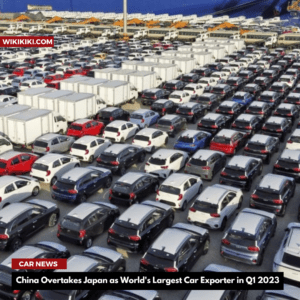China has emerged as the world’s largest car exporter, surpassing Japan in the first quarter of 2023. The significant growth in China’s car exports was driven by the rising demand for electric vehicles (EVs) and increased sales to Russia. This achievement further solidifies China’s position as a major player in the global automotive industry.
Also Read: Alibaba to Spin Off $12 Billion Cloud Business

China has claimed the top spot as the world’s largest car exporter, surpassing Japan in the first quarter of 2023. With a substantial increase in car exports and boosted by the demand for electric vehicles, China’s automotive industry continues to grow at an impressive pace. This article examines the key factors driving China’s rise as the leading auto exporter, the surge in electric vehicle exports, the impact of the Ukraine conflict on trade dynamics, and the strategies employed by Chinese automakers to expand their global market share.
China’s Auto Export Growth
China’s car exports in the first quarter of 2023 reached 1.07 million vehicles, representing a remarkable 58% year-on-year increase. In comparison, Japan’s vehicle exports stood at 954,185 units, a modest 6% rise from the previous year. China’s rapid export growth can be attributed to the rising demand for electric cars and successful sales to markets such as Russia. This achievement follows China’s surpassing of Germany as the second-largest car exporter in the world in the previous year.
Also Read: Gun Violence: Mass Shootings at the United States in 2023
Role of Electric Vehicles in China’s Export Growth
The shift towards electric vehicles has played a crucial role in driving China’s ascent as the largest car exporter. In the first quarter of 2023, exports of new energy vehicles (NEVs), including electric cars, witnessed a remarkable increase of over 90% compared to the previous year. China’s leading NEV exporters include Tesla’s China arm, SAIC (owner of the MG brand), and BYD (backed by Warren Buffett). Tesla’s Gigafactory in Shanghai, which has an annual production capacity of 1.25 million vehicles, has been instrumental in meeting the demand for EVs in both domestic and international markets.
Impact of China-Russia Trade Relations
China’s car exports to Russia have experienced significant growth, particularly since the beginning of the Ukraine war and subsequent trade sanctions imposed on Moscow by Western countries. Chinese automakers, such as Geely, Chery, and Great Wall, witnessed a surge in market share in Russia after competitors like Volkswagen and Toyota exited the market. This trend reflects China’s ability to fill the void left by other global automakers, contributing to its overall export success.
Implications for the Global Automotive Industry
China’s achievement in becoming the world’s largest car exporter signifies its growing competitiveness and influence in the global automotive industry. The country’s strict quality control measures, well-established industrial chain, and advanced maintenance services have enhanced the appeal of China-made vehicles worldwide. As China’s car exports continue to increase, the country has the potential to become a major auto exports country, with experts predicting that exports may reach four million cars in 2023.
Also Read: British Adventurer Sets World Record Visiting 7 Wonders of the World in Under 7 Days
China’s Manufacturing Capacity and Expansion Plans
China’s manufacturing prowess has been a crucial factor in its rise as a largest car exporter. Tesla’s Gigafactory in Shanghai, capable of producing 1.25 million vehicles annually, has become an export hub for regions including Japan and Europe. Tesla’s recent introduction of Model Y sport utility vehicles for export to Canada exemplifies the company’s commitment to expanding its international reach. Additionally, Chinese automakers have sought to enhance their manufacturing capacities and sales margins to meet the growing demand for their vehicles.
Future Outlook and Challenges
China’s dominance as the world’s largest car exporter is expected to continue, with predictions indicating a potential 30% increase in auto exports to reach four million vehicles for the full calendar year. This projection surpasses Japan’s yearly forecast. However, increasing competition in the Chinese market and potential challenges related to chip and battery shortages may impact the industry’s growth trajectory. Chinese automakers will need to continue focusing on maintaining high-quality standards, strengthening the industrial chain, and providing advanced maintenance services to remain competitive on the global stage.
Conclusion
China’s ascent as the world’s largest car exporter signifies its growing influence and competitiveness in the global automotive industry. The surge in electric vehicle exports, successful penetration of key markets like Russia, and significant manufacturing capacity have contributed to China’s remarkable growth. As the country’s automakers continue to expand their global market share, the industry faces both opportunities and challenges in maintaining momentum and meeting the demand for clean, sustainable transportation worldwide.
Also Read: Elizabeth Holmes Ordered to Report to Prison on May 30